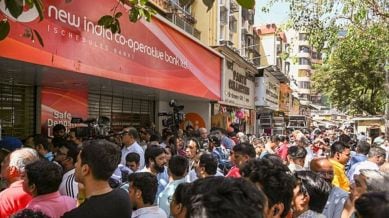RBI clamps curbs on New India Co-operative Bank, depositors queue up outside branches
This is the first major action against a co-operative bank in Maharashtra after the collapse of Punjab and Maharashtra Co-operative Bank due to large scale fraudulent loans.

Panic-stricken depositors on Friday queued up before the branches of Mumbai-based New India Co-operative Bank after the Reserve Bank of India (RBI) clamped severe restrictions on the bank in the wake of certain supervisory concerns. The RBI also superseded its Board of Directors for 12 months, citing “poor governance standards”.
The RBI has appointed Shreekant, a former chief general manager of the State Bank of India (SBI), as the administrator to manage the bank’s affairs. Additionally, a committee of advisors has been formed to assist him, the RBI said.
monthly limit of free stories.
with an Express account.
This is the first major action against a co-operative bank in Maharashtra after the collapse of Punjab and Maharashtra Co-operative Bank due to large-scale fraudulent loans.
The RBI directed the loss-making bank not to grant or renew any loans and advances, make any investment, incur any liability including borrowal of funds and acceptance of fresh deposits, disburse or agree to disburse any payment whether in discharge of its liabilities and obligations without prior approval of RBI in writing. The RBI restrictions came into effect after the close of business on February 13, and will be valid for six months.
The bank has a network of 30 branches and a deposit base of Rs 2,436 crore as of March 2024. The bank had posted losses of Rs 22.78 crore in 2023-24 and Rs 30.74 crore in 2022-23.
According to the RBI, the eligible depositors would be entitled to receive deposit insurance claim amount of their deposits up to a monetary ceiling of Rs 5 lakh from the Deposit Insurance and Credit Guarantee Corporation (DICGC), as applicable under the provisions of the DICGC Act, 1961. It will be based on submission of willingness by the depositors concerned and after due verification, it said.
This means a depositor who has an FD of Rs 10 lakh in the bank will get only Rs 5 lakh as insurance claim amount from the DICGC.
“These directions are necessitated due to supervisory concerns emanating from the recent material developments in the bank, and to protect the interest of depositors of the bank,” the RBI said in its directions issued on Thursday evening. Most of the bank’s branches are located in Mumbai and Thane areas.
The RBI said the bank cannot enter into any compromise or arrangement and sell, transfer or otherwise dispose of any of its properties or assets except as notified in the RBI direction dated February 13, 2025.
“Considering the bank’s present liquidity position, the bank has been directed not to allow withdrawal of any amount from savings bank or current accounts or any other account of a depositor,” the RBI said. However, it has allowed to set off loans against deposits subject to the conditions stated in the above RBI directions, it said.
However, the bank may incur expenditure in respect of certain essential items such as salaries of employees, rent and electricity bills as specified in the said directions.
The central bank said the issue of the directions by the RBI should not be construed as cancellation of banking licence by the RBI. The bank will continue to undertake banking business subject to restrictions specified in the said directions till its financial position improves, it said.
“The RBI continues to monitor the position of the bank and will take necessary actions including modifications of these directions, as warranted, depending upon circumstances and in the interest of the depositors,” it said.